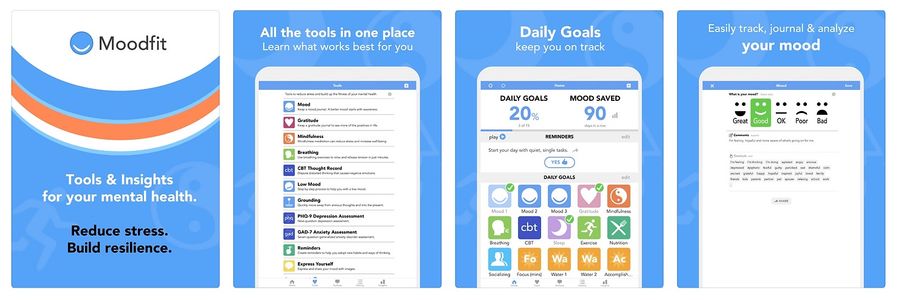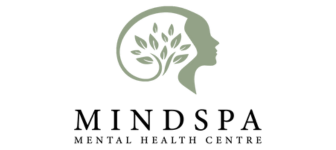As a therapist, I am always looking for new strategies to help my clients. And one of the most challenging things about therapy can be accurately sharing with your therapist how you have been doing between sessions.
Are Mental Health Apps Really Worth the Time and Money? A Therapists Moodfit Review

Routine and old habits kick in, the repetitiveness of life blurs days and weeks together, and the details of major life events get forgotten. This can lead to a significant disconnect between the one hour of weekly therapy and the rest of a client’s day-to-day life. Moodfit is a great, low-cost ($40.00/year for the premium version) resource to help reconnect therapy with life.
The Free Version
The free version of Moodfit has:
Gratitude Journal
Mood Journal
Gratitude Journal
Gratitude journals are proven to help people refocus their minds on what is going well in their life and what makes them happy. This is very helpful because our reptilian brain (the part of our brain that is mainly concerned with survival) has a default mode to negativity, fear, and scarcity. A gratitude journal uses focused intention to attend to positivity, calm, and abundance.
Mood Journal
Mood journaling is a great way to improve engagement in therapy, as it has you regularly check in with yourself and track your mood, which will help with identifying triggers, mood and behaviour patterns that can then be discussed in therapy.
The Paid Version
The premium version of Moodfit has the mood journal and gratitude journal but also has:
Cognitive behavioural therapy (CBT) thought record
Two mental health assessment tools (Patient Health Questionnaire 9 (PHQ-9) for depression and the Generalized Anxiety Disorder 7 (GAD-7) for anxiety)
Medication log
Reminders
Custom activity tracking
Mindfulness meditation
Breathing exercises
Sleep and lifestyle
Mood insights
Personalized reports
Articles
Passcode protection
Unlimited goals and self-care
Cognitive behavioural therapy (CBT) thought record
A cognitive behavioural therapy thought record is a helpful tool that has the client record the triggering event, the emotion, the automatic thoughts, the evidence to support the automatic thought, evidence that disproves the automatic thought, a more balanced thought, rerating of the emotion after going through the thought record.
This tool has been scientifically proven to decrease emotional distress and help process difficult emotions and experiences.
Mental health assessment tools
Using assessment tools for depression and anxiety (Patient Health Questionnaire 9 (PHQ-9) for depression and the Generalized Anxiety Disorder 7 (GAD-7) for anxiety) are helpful to identify your starting point and progress during therapy. They are also helpful to identify common signs of depression and anxiety, and give individuals an easy way to discuss their symptoms with their therapist and/or their doctor.
Medication Log
Medication logs are incredibly helpful when starting, stopping and or changing medications. Very often it is difficult to remember when a medication has started, dose changes, side effects, and improvements. However, these are crucial pieces of information for doctors when helping a client find the right medication for them. This information is also very helpful for therapists to know when understanding the context of a client’s mood stability and or instability.
Reminders
Reminders work well to help clients change their old habits and establish new ones. Habit change is often an important part of the change process to improve mental health.
Activity tracking
Activity tracking is helpful to inform both the individual and therapist what behaviors the client is engaging in between sessions. This also provides the opportunity to set activity goals for the week as well. Many activities act as protective factors for mental health such as: going for a walk in nature, yoga, meditating, stretching, exercise, reading, etc.
The activity tracking feature is also customizable that can allow you to track psychotherapy sessions, nutrition, socializing, amount of sun exposure, and water consumption…the possibilities are endless.
Mindful Meditations
Consistent mindful meditation has been proven to promote awareness about how you think, decrease overthinking and rumination, and enhance attention through improvements in working memory. Mindfit helps the user develop a consistent mindful practice.
Breathing Exercises
Breathing exercises help users with stress management. Mindfit walks the user through 7 different breathing exercises to induce calm, relieve tension, reduce stress and energize the mind.
Sleep Record
Sleep has a significant impact on mental health. Tracking sleep and speaking to a therapist about sleep is an important factor in the therapeutic process and Moodfit gives a convenient way to track and discuss sleep issues.
Goal Setting
The goal function of Moodfit allows for personalized goals to be set and tracked which can be done individually or in partnership with a therapist. Setting goals are linked with higher motivation, self-esteem, self-confidence, and autonomy, which all improve mental wellbeing.
Personalized Reports
My personal favourite function is the reports function. This allows the information to be summarized into an easy-to-read report that when shared with the user’s therapist would provide amazing insight into the weekly functioning of the client and allow for customized and accurate recommendations from the therapist.
Conclusion
I believe this app is an amazing stand-alone app to improve mental well-being but it is also an incredible tool that a client and therapist can use together since the information collected can be sent easily to the therapist to be included in the client's record.
This will help inform therapy and allow the therapist and client to co-create goals, reminders, and activities individually suited to the client and customized with the help of a professional mental health worker.
